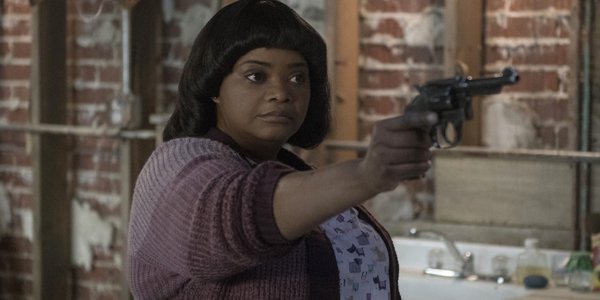How Ma Became A Completely Different Movie When Octavia Spencer Got Involved

Your Daily Blend of Entertainment News
You are now subscribed
Your newsletter sign-up was successful
Tate Taylor’s Ma is a clear-cut high-concept film. Octavia Spencer stars as Sue Ann, a lonely woman with a traumatic past who sees an opportunity for popularity when she is approached by a group of kids in search of alcohol – but things turn terrifyingly sour when the group starts to find her a bit overbearing and obsessive. On its feet it’s a classic setup for a horror movie… but that just makes it all the more surprising how much it actually changed through its development.
As I recently learned during an interview with the film’s director, while some of the ideas for the story were in place from the start, it’s a project that really didn’t come together as we see it in its final form until both he and Octavia Spencer got involved. Originally it was more of a serial killer story, featuring a white woman luring teenagers to a horrific fate, butt in the hands of the long-time collaborators it ultimately became much more.
I sat down with Tate Taylor earlier this month during the Los Angeles press day for Ma, and it was when I asked about how much the movie changed from the first draft of the script to the final cut in the editing room that I learned just how much it evolved thanks to the creatives developing it. It started with a bit of “crazy” serendipity, with the director simply taking a meeting with producer/studio head Jason Blum, who presented him with a screenplay that he admitted still needed quite a bit of workshopping. Said Taylor,
A month before, Octavia told me she was sick of only being offered the same role and never getting to be a lead. A month later, I go to – Jason is a friend - I go to his office to talk to him about what we could possibly do together. And they're thinking like a drama, you know, they branch out, and I said I want to do something fucked up. And he's like, 'Really?' I'm like, 'Yes!' And the day before they had gotten Ma and he goes, 'This needs work. See if you could do anything with this.' And it was written for a white woman.
But just because the early draft of the script was written specifically for a white woman didn’t stop Tate Taylor from seeing it as a potential vehicle for his best friend, former roommate, and longtime collaborator – with whom he has worked now on four of his five features as a director.
Coming out of the meeting, Taylor’s first instinct was to call Octavia Spencer and gauge her interest in making the movie with him – and while she was initially hesitant about taking on a horror project because one of the more significant and outdated tropes of the genre, she quickly got more interested when he started to describe what kind of role he had in mind for her:
The first thing I did is I called Octavia, and I said, 'Would you want to be in a horror movie?' She's like, 'Am I the black person who gets killed first?' I go, 'No, you get to kill the people.' She goes, 'Yes.' She goes, 'Fuck yes, I don't need to read it, I trust you!' 'Well, you're gunna read it.' So I came back to Jason, and they were like, 'Really?' And I'm like, 'Yeah!'
That simple hook was apparently enough to draw Octavia Spencer to Ma, but Tate Taylor further stressed that what he had in mind for the project was a lot more than just having her as a psychotic serial killer who murders teens for essentially sport. And in that sense, the script needed a lot of work. It was a crumb of an idea that he enjoyed for nostalgic reasons, fondly remembering his time as a kid hanging out in front of liquor stores trying to get adults to buy booze for him and his friends, but where his interest really took hold was in exploring Sue Ann as a real character and giving her not only real motivation, but an in-depth backstory.
According to Taylor, none of that was present in the Ma script he originally got from Jason Blum, which was apparently had a lot more focus on body horror than it did on character and drama. Said the director,
Your Daily Blend of Entertainment News
There was no back story. It was not in the script at all. A woman buys beer and then they end up... well, the script then had their heads being chopped off and sewn on different bodies. So then I'm like, 'Well, you got to keep it in reality, you know?' So that was the journey. The shifts in the script came from me creating her backstory, which has empathy, and as it came in some of the scenes just had to reflect that.
To explain the exact beats that were ultimately injected into Ma and its backstory for Sue Ann would be giving away too much prior to the film’s release, the film really did become something much different than what was initially envisioned before Tate Taylor and Octavia Spencer became involved. And while the project evolved to become the first horror feature developed by them as a director/actor duo, the work really did become more familiar to them as the themes and proper story developments emerged. Taylor explained,
I said this needs to be about something - about trauma, and the sins of our parents and how we treat people, and then I wove that into it. For me, when movies are successful your lead is not so honorable. You relate to them, and you feel bad for them.
Like any film, Ma took months of work to become what it was ultimately meant to be, but now audiences will be able to experience it all for themselves. The movie, which co-stars Diana Silvers, Juliette Lewis, Luke Evans, Missi Pyle, Allison Janney, McKaley Miller, and Corey Fogelmanis, arrives in theaters this weekend – and be sure to stay tuned here on CinemaBlend for more about the film from my interview with Tate Taylor!

Eric Eisenberg is the Assistant Managing Editor at CinemaBlend. After graduating Boston University and earning a bachelor’s degree in journalism, he took a part-time job as a staff writer for CinemaBlend, and after six months was offered the opportunity to move to Los Angeles and take on a newly created West Coast Editor position. Over a decade later, he's continuing to advance his interests and expertise. In addition to conducting filmmaker interviews and contributing to the news and feature content of the site, Eric also oversees the Movie Reviews section, writes the the weekend box office report (published Sundays), and is the site's resident Stephen King expert. He has two King-related columns.
